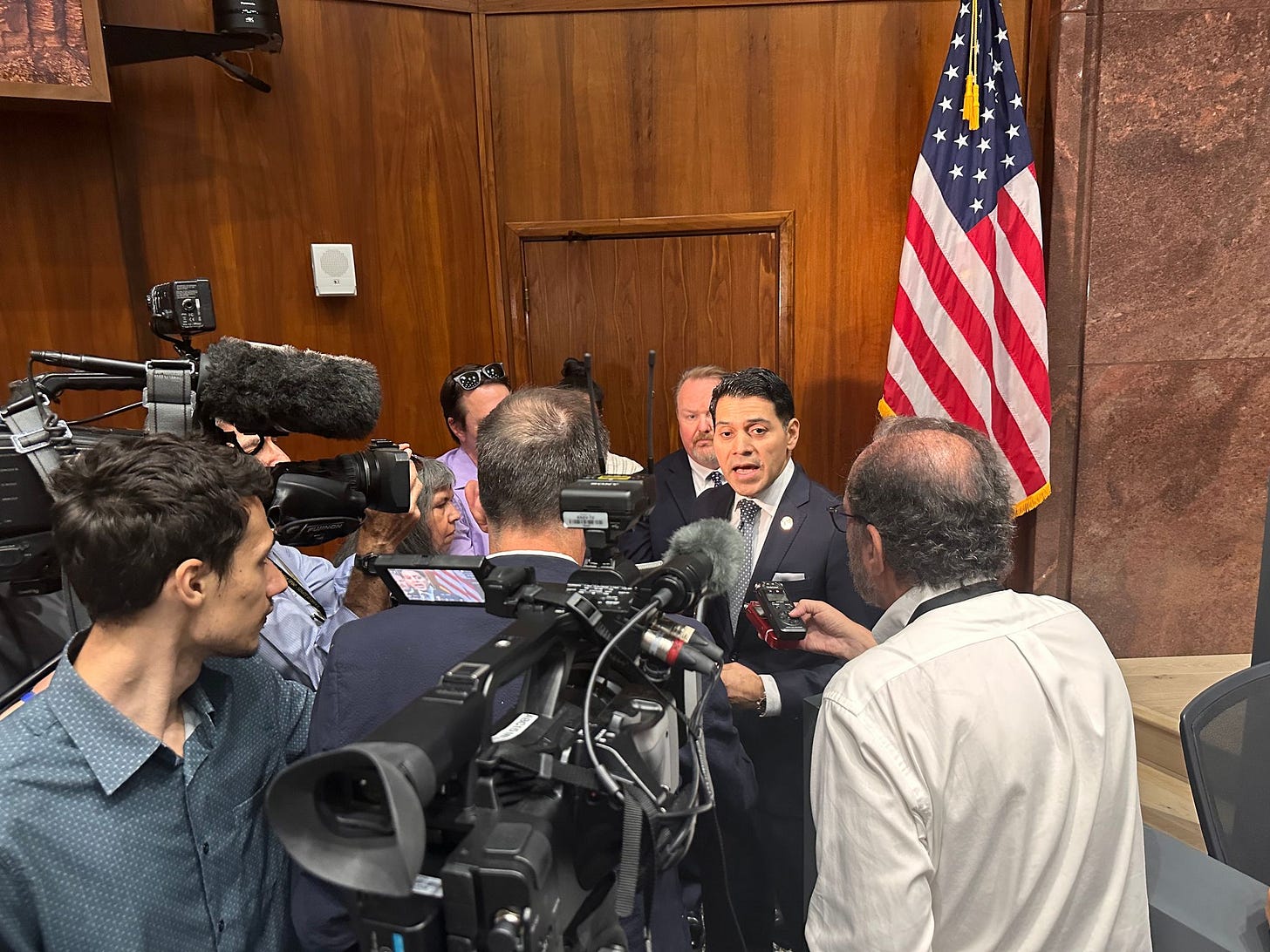
Budget 3.0
A snowball’s chance in hell … Tomato, tomato … And he’s a big hit with the ladies.
Arizona’s Legislature is moving alarmingly close to causing a state government shutdown.
House Republicans introduced a continuation budget yesterday that mainly funds core government services, even though Gov. Katie Hobbs said any continuation budget “will immediately meet (her) veto pen.”
The continuation budget, or “skinny” budget, only funds baseline needs to avoid a government shutdown.

House Speaker Steve Montenegro took about four minutes’ worth of media questions yesterday and said public safety is a priority four times.Republican Sen. John Kavanagh, one of the chief budget negotiators, said he’s not sure what his colleagues in the House are trying to accomplish, since Hobbs will clearly veto a conservative continuation budget. But the potential of a brief government shutdown doesn’t worry him much.
“My advice to you is, if we don't have a budget on July 1, do not go speeding down the I-10, because you will probably get a ticket from a state trooper,” he quipped.
Republicans sent Hobbs a continuation budget in early 2023 to cover their bases in case negotiations didn’t work out, and she vetoed it. And back in March 2020, lawmakers passed a baseline budget right before they went home because of COVID-19.
The difference this time is that there are six days left to pass a budget, and an international pandemic isn’t killing people. Plus, Hobbs did Republican lawmakers the favor of telling them where their continuation budget plans are going before they waste at least three days passing one.1
Still, the House Appropriations Committee is meeting at 10 a.m. today to discuss its second doomed budget of the year.
Republican Rep. David Livingston, who heads the House Appropriations Committee, called it “The simplest, most basic budget I think this institution has seen in decades.”
House Democratic Leader Rep. Oscar De Los Santos said the new budget doesn’t have “a snowball's chance in hell of being signed into law.” He's advocating for the House to pass the Senate budget, saying most of his members would support it even with the immigration-related funding that many of his Democratic colleagues don't like.2
In case you missed it, here’s why this year’s budget process is particularly chaotic:
House Republicans put together their own budget without the governor or Senate, which is not how making a budget works.
Last week, the Senate passed the budget it negotiated with Hobbs, then adjourned for the session, which it’s not supposed to do without the House’s consent.
Everyone thought the House would give up on its rogue budget and work to pass the Senate’s through the weekend. Instead, the House adjourned until Monday. House Speaker Steve Montenegro said his chamber doesn’t have enough votes to pass the Senate budget and announced the continuation budget plan.
Oh, and Trump bombed Iran, which doesn’t really have anything to do with the budget, but doesn’t it make this whole process feel more dystopian?
Kavanagh, who commandeered the Senate’s budget, said the Senate’s motion to sine die last week came with an “asterisk” that voids the motion if prohibited by law, and since the Senate didn’t get House approval, it was a fake adjournment. The Senate is coming back Wednesday at 10 a.m., he said.
“I think it was a statement. We should be out of here, there's no reason to be hanging around except for Kavanagh’s two remaining bills in the house,” Kavanagh told us.
Montenegro finally took questions from reporters yesterday, answering more questions than he has throughout the entire budget circus. It lasted about four minutes.
The House leader said conversations are continuing, and that House Republicans want to vet “every piece of information” in the budget. He noted that budget-makers included a few of Hobbs’ priorities in the House’s budget version as evidence “the House has always been open to conversations.”
When reporters pressed Montenegro about claims that he was invited to budget negotiations but had skipped out, he said he didn’t like the “take it or leave it approach” that budget talks started with. So he left them.
“Arizona has always been okay, and we're going to continue,” Montenegro said.
Whether that’s forward or backward remains to be seen.
The tomato wars: Republicans and farm groups are urging the Trump administration to block a 20% duty on Mexican-grown tomatoes that is set to come into effect next month, since the Commerce Department announced it wouldn’t extend the “Tomato Suspension Agreement” with Mexico that has been holding the tariff at bay. And while Florida tomato growers are stoked, Arizona Republican members of Congress, including Eli Crane, Andy Biggs and Juan Ciscomani, are urging Trump to reconsider, saying ending the agreement would “abandon a key achievement and principle of President Trump’s America First agenda,” Politico reports. Also, Florida tomatoes are gross, tomato book author William Alexander writes in the opinion pages of the New York Times. And allowing the agreement to expire would mean that a bunch of Mexican tomato farmers will want H-2A visas to work in Florida.
“While the tariff will drive up the cost of both Mexican- and American-grown tomatoes, consumers won’t be the only losers. Arizona State University estimates that job losses among the warehouse operators, truckers and grocers who process and move tomatoes from the border throughout the United States could exceed 50,000 in Arizona and Texas alone,” Alexander writes.
$500 million for sports fans: Lawmakers sent a handful of bills to Gov. Katie Hobbs yesterday, including most notably the bill giving massive tax breaks to the Arizona Diamondbacks so their owners can fix up their stadium, which Hobbs has signaled she’ll sign. The “ag-to-urban” bill that would allow developers to meet assured water supply requirements by buying out farm land passed the House yesterday and now heads to Hobbs’ desk.3
Just once, we’d like to see a massive tax break for local independent news outlets. Until then, please subscribe. We have taxes to pay!
Spy cams are everywhere: The City of Sedona is installing a dozen license plate tracking cameras around town that will scan every passing plate and upload it into a national database. It can build a profile for each vehicle based on “the make, vehicle type, color, license plate … and the unique features of the vehicle, including damage and aftermarket alterations.” The Sedona City Council never discussed the decision, Red Rock News’ Tim Perry reports, and the ACLU says the company that makes the cameras, Flock, is building “a nationwide mass surveillance system.”
“Unlike a targeted ALPR camera system that is designed to take pictures of license plates, check the plates against local hot lists and then flush the data if there’s no hit, Flock is building a giant camera network that records people’s comings and goings across the nation, and then makes that data available for search by any of its law enforcement customers,” the ACLU wrote in 2023.
Everything old is new: The number of 287(g) agreements has exploded since Donald Trump took office in January, from about 135 nationwide to more than 700, the Washington Post reports. 287(g) agreements allow local cops and sheriffs to enforce immigration laws during routine interactions and traffic stops, and they were the main tool that former Maricopa County Sheriff Joe Arpaio used during his immigration sweeps around the Valley. Meanwhile, KJZZ’s Wayne Schutsky broke down the Trump campaign’s promise to deport “criminals” and the trickery needed to follow through on those promises. Finally, the libertarian Cato Institute’s David J. Bier found roughly two-thirds of the people taken into custody by ICE since October had no criminal convictions, and 93% had no violent convictions.
No innovation needed: ASU President Michael Crow extolls the virtues of international students, noting that America has been inviting them since Alexander Hamilton immigrated to the U.S. in 1772 to study. In an oped in the Wall Street Journal, he took no shots at the Trump administration but noted that ASU is home to 18,000 international students who didn’t take slots from Americans.
“We don’t do this at the expense of American students. No American student loses his seat to an international student — ASU admits every qualified student who applies,” he wrote.
Here’s a weird one: Democratic state Sen. Catherine Miranda is accusing the State Bar of retaliating against a lawyer who helped her sue her late husband’s nephew4 for defamation, the Republic’s Jason Wolf reports. The lawyer, Sheree Wright, has filed multiple discrimination suits against the Phoenix Suns on behalf of four current and former team employees, and the Suns are trying to discredit her by pointing to a whole lot of problems she has had with the Bar, including in the case where she represented Miranda. But Miranda stood up for Wright in a letter to the Bar, saying the fact that her case is being brought up shows a “deliberate attempt to publicly challenge Attorney Wright’s credibility and, by extension, discredit my own name and reputation.”
Ever wondered what a rally for young conservative women put on by the Arizona-based Turning Point USA would look like?
If you imagine “light on discussions about policy — immigration raids, trade wars — but heavy on dating, parenting and nutrition advice,” you’d be correct.
The New York Times has a profile of the event, which was headlined by MAGA organizer and Turning Point founder Charlie Kirk, that is chock-full of jaw-droppers like this:
Bills have to be read three times on three separate days in each chamber to pass, unless the lawmakers can conjure up a 2/3 majority vote to bypass that requirement. Today, the House will read the bills for the second time.
That’s in contrast to what we speculated yesterday: that House Democrats had seemingly only rounded up a handful of votes for Hobbs’ budget.
CORRECTION: A previous version of this edition incorrectly stated that the ag-to-urban bill still needed final approval before heading to the Governor’s Office. That was a final vote — it’s on her desk now
Miranda’s late husband was Ben Miranda, a longtime legislative leader and lawyer. There’s a lot of political drama in that family.
















For the record, legislators can fulfill the constitutional requirement of reading all bills three times on three separate days in under 24 hours with some legislative maneuvering. The process would involve striking a bill onto another bill that was already heard in committee, and therefore was already first read. After passing out of committee, the bill could be read a second time and put through the committee of the whole. Finally, at one minute after midnight, which is a new day, the bill could be voted out of the chamber. Using mirror bills, the legislature could immediately transmit the bill to the governor. Only a majority of members would be needed to do this because a simple majority vote can waive posting and agenda rules.
I will reveal other legislative mysteries like this one next week, when I publish my new book, "State Legislatures: An Owner's Manual."
Kavenaugh has been around so long, he knows how to manipulate and get around the system of good politics. Does it always have to be about "mousetraps"? Isn't it time for him to retire? He's 74 and based on recent news regarding "seniors" in our Legislatures and Congress, wouldn't it be nice if he would gracefully retire and step aside for younger generations?